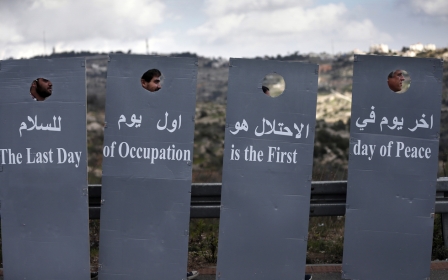Israel’s defence establishment is sounding the moral alarm

Last week, at a Memorial Day ceremony held in the Kiryat Shaul military cemetery in Tel Aviv, the Israeli Defence Minister Moshe Yaalon called for the safeguarding of Israeli morals and ethics, and recommended restraint in the use of military force.
“Even in the fury of battle, when the blood boils and rage is high, we must not lose ourselves or our values. Our morals and ethics should be sanctified; compromising on them could push our society down a slippery slope. We must use force when necessary, but also understand its limitations and its desensitising abilities. We must maintain our purity of arms and our humanity; we must not lose ourselves,” he stated.
Yaalon was likely referring to the case of 19-year-old Israeli Sergeant Elor Azaria, who, on 18 April, was indicted for manslaughter and inappropriate military conduct in the military court in Jaffa, Israel, after he shot dead a Palestinian assailant in Hebron, West Bank.
The remarks of Yaalon are in line with those made by Israel Defence Forces (IDF) Chief of Staff Gadi Eisenkot in February 2016. Speaking at a high school in the Israeli coastal city of Bat Yam, Eisenkot argued that an Israeli soldier must not shoot to kill at a terrorist if the terrorist in question does not present an actual threat to human life.
“When there’s a 13-year-old girl holding scissors or a knife, and there is some distance between her and the soldiers, I do not want to see a soldier open fire and empty his magazine at a girl like that, even if she is committing a very serious act [of terrorism],” he explained.
Eisenkot was referring to the November 2015 incident in which an off-duty Israeli policeman shot two Palestinian teenagers who had stabbed a man with a pair of scissors in central Jerusalem. The policeman killed one of the assailants, and critically injured the other.
It is unusual for senior IDF figures to comment on cases of apparent excessive use of force. However, for the past few months, the core of the Israeli defence establishment is publicly encouraging the Israeli people to uphold high moral and ethical standards, and – even – to conduct national constructive criticism.
On the eve of Holocaust Remembrance Day, at a ceremony in Kibbutz Tel Yitzhak, IDF Deputy Chief of Staff General Yair Golan – the second-highest ranking officer in the IDF– gave a speech in which he called for national introspection.
He asserted the following: “If there's something that frightens me about Holocaust remembrance, it's the recognition of the revolting processes that occurred in Europe in general, and particularly in Germany, back then – 70, 80 and 90 years ago – and finding signs of them here among us today in 2016.”
He then added: “On Holocaust Remembrance Day, it is appropriate to discuss our own ability to uproot from our midst the first signs of intolerance, violence and self-destruction that arise on the path to moral degradation. In fact, Holocaust Remembrance Day is an opportunity for introspection. If Yom Kippur is the day of individual introspection, then it is imperative that Holocaust Remembrance Day be a day of national introspection, and this national introspection should include phenomena that are disruptive.”
A political debate rapidly ensued. Right-wing Israeli politicians demanded that General Yair Golan immediately retract his statement, which, in their opinion, belittled the Holocaust.
For example, Education Minister and Jewish Home party leader Naftali Bennett tweeted: “Just before Holocaust deniers use these erroneous words in their banners, just before our soldiers are compared to the Nazis, God forbid, with endorsement from our top ranks; the deputy chief of staff has erred, and he must rectify immediately.”
For his part, Israeli Prime Minister Benjamin Netanyahu made the following statement: “The comparison that was made in IDF Deputy Chief of Staff Maj. Gen. Yair Golan's remarks about processes that characterised Nazi Germany 80 years ago is infuriating. The remarks are fundamentally incorrect. They should not have been made at any time, much less now. They do an injustice to Israeli society and belittle the Holocaust. The deputy chief of staff is an outstanding officer, but his remarks on this issue were utterly mistaken and unacceptable to me.”
Ironically, Israeli Prime Minister Benjamin Netanyahu often refers to Holocaust analogies for political gain. During the international negotiations for a framework deal over the nuclear programme of the Islamic Republic of Iran, he demonstrated that comparisons between the Holocaust and the present are his number one rhetorical weapon of choice.
Food for thought: is not using Holocaust analogies for political gain belittling the Holocaust as well?
On the other hand, left-wing Israeli politicians argued that General Golan’s remarks were courageous, and that he is filling a vacuum of leadership.
Opposition leader Isaac Herzog, the head of the centre-left Zionist Union Party, wrote the following post on his Facebook page: “The Deputy Chief of Staff is the commander of the courageous. The disturbed people who will start shouting against him ought to know: this is what morality and responsibility sound like.”
Tzipi Livni, also a Zionist Union member of the Knesset, said: “If, instead of attacking the deputy chief of staff, Netanyahu would act in the public arena in order to prevent racist and extremist phenomena, we would have no need for senior officers, of whose bravery I am proud, to fill this vacuum of leadership.”
For her part, Joint List Member of Knesset Aida Touma-Sliman argued that the attack on Yair Golan stems from “those same developments he is warning against,” including the rise of militant nationalism in Israel.
Amid the political debate, the IDF spokesperson’s unit released an explanatory statement: “The deputy chief of staff would like to clarify that he had no intention to compare the IDF and the State of Israel to the process that took place in Germany 70 years ago. The absurd comparison is entirely without foundation, and there was no intention to draw such parallels or to criticise the state's leadership. The IDF is a moral army which safeguards the purity of arms and human life.”
Whether General Golan’s assertion did somehow compare the IDF to the Wehrmacht, the State of Israel to the Nazi regime, and Palestinians, by extension, to persecuted Jews, is a matter of interpretation. It is clear, however, that Golan’s remarks, as those of other senior IDF-related figures, are a public call for reflection on the moral quality of Israeli society.
Unfortunately, at present, to question the moral quality of Israeli society and/or the moral quality of its leadership and its decisions is to be branded a lefty – at best – or a self-hating Jew, anti-Semite, and/or Holocaust denier – at worst. Daring to criticise – even from a pro-Israeli standpoint – certain policies of the State of Israel, particularly the occupation of the West Bank, implies becoming public enemy number one.
This is what Israel’s defence establishment has been doing for a while.
First, it is disagreeing with governmental decisions. The 2012 documentary The Gatekeepers is a great example of how senior domestic security and defence figures differ in opinion from the Israeli government: former Shin Bet figures explain why, from a security and defence viewpoint, a deal with the Palestinian leadership could be advantageous to Israel. Despite the fact that this deal could be easily achieved now – given the openness of the Saudi-led Arab League – the Israeli government is doing little to nothing in this regard.
Now, Israel’s defence establishment is also daring to ask the people of Israel to restraintthe use of military force, and to meditate on the status of morality and ethics in the country. This request is countering the government’s nationalist discourse, which has been accompanied by antidemocratic legislation, and triggering a very needed public debate on the way Israelis relate to themselves and the perceived other.
- Tania Ildefonso Ocampos is a Spanish political analyst who specialises in EU strategy in the Middle East. She is a former Schuman trainee (Euro-Med and Middle East Unit of the European Parliament's Directorate-General for External Policies), and holds an MA in Middle Eastern History from Tel Aviv University, Israel.
The views expressed in this article belong to the author and do not necessarily reflect the editorial policy of Middle East Eye.
Photo: Israeli soldier Elor Azaria who was caught on video shooting a wounded Palestinian with his family (AFP).
Stay informed with MEE's newsletters
Sign up to get the latest alerts, insights and analysis, starting with Turkey Unpacked
Middle East Eye delivers independent and unrivalled coverage and analysis of the Middle East, North Africa and beyond. To learn more about republishing this content and the associated fees, please fill out this form. More about MEE can be found here.





